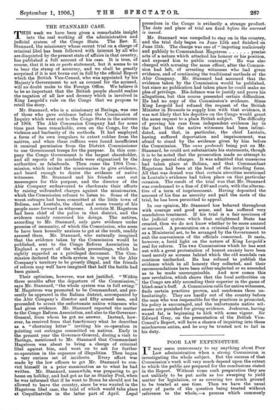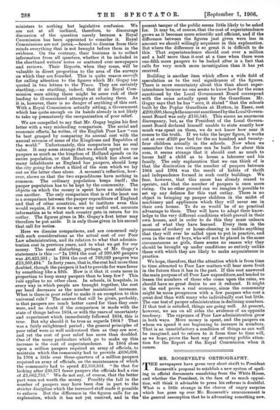POOR LAW EXPENDITURE.
IT may seem unnecessary to say anything about Poor Law administration when a strong Commission is investigating the whole subject. But the success of that Commission's work will very much depend upon the extent to which the public are prepared for the conclusions stated in the Report. Without some such preparation they are not unlikely to be put aside as too sweeping to yield matter for legislation, or as covering too much ground to be treated at one time. Then we have the usual story pf parts of the question being treated 'without reference to the whole,—a process which commonly ministers to nothing but legislative confusion. We are not at all inclined, therefore, to discourage discussion of the question merely because a Royal Commission has been appointed to consider it. Royal Commissions are not juries,—bound to dismiss from their minds everything that is not brought before them in the evidence. On the contrary, their business is to collect information from all quarters, whether it be included in the shorthand writers' notes or scattered over newspapers and reviews. Their Reports, when they come, will be valuable in direct proportion to the area of the surveys on which they are founded. This is quite reason enough for calling attention to the figures which Mr. Gogay has quoted in two letters to the Times. They are certainly startling,—so startling, indeed, that if no Royal Com- mission were sitting there might be some risk of their leading to ill-considered attempts at reducing them. As it is, however, there is no danger of anything of this sort. With a Royal Commission actually sitting, a Government which has quite enough on its hands already is not likely to take up prematurely the reorganisation of poor relief.
We are compelled to say that Mr. Gogay begins his first letter with a very misleading comparison. The social and economic effects, he writes, of the English Poor Law "can be best grasped by comparing its annual cost with the annual revenue of some of the Kingdoms and Republics of the world." Unfortunately, this comparison has no real value. It may seem strange that we should spend on our paupers as much as the kingdom of Holland spends on its entire population, or that Hamburg, which has about as many inhabitants as England has paupers, should keep the city going for about a third of the sum which we lay out on the latter class alone. A moment's reflection, how- ever, shows us that the two expenditures have nothing in common. The ordinary population keeps itself; the pauper population has to be kept by the community. The objects on which the money is spent have no relation to one another. The only comparison that is of the least use is a comparison between the pauper expenditure of England and that of other countries, and to institute even this would require, if it were to serve any useful end, accurate information as to what each country gets in return for its outlay. The figures given in Mr. Gogay's first letter may therefore be put aside. It is only those given in his second that call for notice.
Here we dismiss comparisons, and are concerned only with such considerations as the actual cost of our Poor Law administration, and its relation to what that adminis- tration cost in previous years, and to what we get for our money. The most disturbing, perhaps, of Mr. Gogay's statements is this :—" In 1864 the cost of 999,400 paupers was £6,423,881; in 1904 the cost of 769,029 paupers was L13,369,494." In forty years, that is, the cost had more than doubled, though the paupers it had to provide for were fewer by something like a fifth. How is it that it costs more in proportion to keep many paupers than to keep few ? This rule applies to no other class. In schools, in hospitals, in every way in which people are brought together, the cost per head decreases as the number maintained increases. What is there in poor relief to make it an exception to this universal rule ? The answer that will be given, probably, is that paupers are much better cared for than they once were, and no doubt if the comparison is made with the' state of things before 1834, or with the years of uncertainty and experiment which immediately followed 1834, this is true. But why should it be true as regards 1864? That was a fairly enlightened period ; the general principles of poor relief were as well understood then as they are now, and yet the cost of poor relief has more than doubled.
One of the many particulars which go to make up this increase is the cost of superintendence. In 1864 close upon a million paupers required an army of officials, to maintain which the community had to provide £696,098. In 1904 a little over three-quarters of a million paupers required an army of officials, on the maintenance of which the community had to spend £2,358,851. "So that for looking after 230,371 fewer paupers the officials had a rise of Z1,662,753." We do not say, of course, that the better part were not worth the money. Possibly the fall in the number of paupers may have been due in part to the stricter discipline which the increased staff made it possible to enforce. But the difference in the figures calls for an explanation, which it has not yet: received, and in the present temper of the public seems little likely to be asked for. It may be, of course, that the cost of superintendence grows-as it becomes more scientific and efficient, and if the difference between the figures just given were less in amount we should willingly acquiesce in this explanation. But where the difference is so great it is difficult to do this. That superintendence should cost over a million and a half more than it cost at a time when there were one-fifth more paupers to be looked after is a fact that calls for very much more investigation than it has yet received.
Building is another item which offers a wide field of speculation as to the real significance of the figures. There is more uncertainty about this than about super- intendence because no one seems to know how far the sums sanctioned by the Local Government Board correspond with the sums actually spent by the Guardians. Mr. Gogay says that he has "seen, it stated" that the schools built by the Poplar Guardians at Hutton, in Essex, cost £200,000, though the amount sanctioned by the Local Govern- ment Board was only £156,545. This seems an enormous discrepancy, but, as the President of the Local Govern- ment Board declared himself unable to state exactly how much was spent on them, we do not know how near it comes to the truth. If we take the larger figure, it works out at over £320 per bed for the six hundred and twenty- four children actually in the schools. Now when we remember that two cottages can be built for about this sum, it seems strange that it should cost as much to house half a child as to house a labourer and his family. The only explanation that we can think of is that the diminution in the number of paupers between 1864 and 1904 was the result of habits of thrift and independence formed in such costly buildings. We fear, however, that this cause has already ceased to operate, and that the number of paupers is once more rising. On no other ground can we imagine it possible to set up any defence for this vast outlay. There is no object in bringing up pauper children in the midst of machinery and appliances which they will never see in their own homes. To do so would be of no practical advantage to them. They will have to adapt their know- ledge to the very different conditions which prevail in their own homes, and in order to do this they must unlearn most of what they have learned. Every item in the processes of cookery or house-cleaning is unlike anything that they will ever be called upon to put in practice, and even in the case of boys, who will not be placed in the same circumstances as girls, there seems no reason why they should be brought up under conditions so entirely unlike those with which they are likely to make acquaintance in practice.
We hope, therefore, that the attention which is from time to time attracted to Poor Law matters will bear more fruit in the future than it has in the past. If this cost answered the main purpose of all Poor Law expenditure, and tended to lessen the numbers of those who come upon the rates, we should have no great desire to see it reduced. It might in the end prove a real economy, since the community might be more prosperous with a few paupers who cost a great deal than with many who 'individually cost but little. The one test of pauper administration is declining numbers. If that test is satisfied, things are going well. At present, however, we see on all sides the evidence of an opposite tendency. The expenses of Poor Law administration grow in both ways. More money is spent, and. the paupers on whom we spend it are beginning to increase in numbers. That is as unsatisfactory a condition of things as can well be imagined, and to return to it from time to time will, as we hope, prove the best way of securing public atten- tion for the Report of the Royal Commission when it Comes.



































 Previous page
Previous page